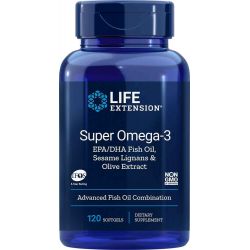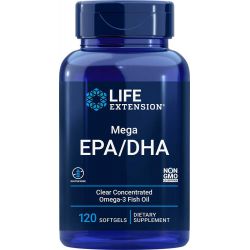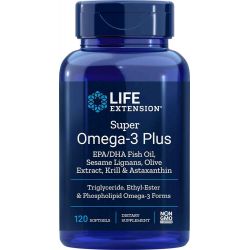Omega 3. Groundbreaking Study Reveals New Mechanism Behind Fish Oil's Health Benefits
 By now most people know that omega-3 fatty acids from fish oil have remarkable health-protecting benefits. In fact, the science behind it is so strong that Big Pharma has jumped on board with expensive fish oil prescription drugs.1
By now most people know that omega-3 fatty acids from fish oil have remarkable health-protecting benefits. In fact, the science behind it is so strong that Big Pharma has jumped on board with expensive fish oil prescription drugs.1
But if you've ever been tempted to pay top dollar for Big Pharma's knockoffs,2-4 a 2012 study shows once and for all that a quality fish oil supplement provides everything you need for powerful protection against some of the most dreaded diseases of aging.
This landmark study found that the components in fish oil not only stop inflammation in its tracks—they actively treat inflammation that is already present. But better than that, the researchers discovered the secret behind fish oil's super-nutrient status.5
After nearly a decade of intense research and discovery, scientists uncovered a newly characterized class of inflammation-regulating molecules that add an entirely unique dimension to the benefits of fish oil.6
In this article, we'll explore how these molecules contribute to—and expand—the already impressive array of health benefits obtainable from omega-3 fatty acids.6,7 Then we'll look at compelling studies that demonstrate how fish oil can help you avoid or reduce the chronic inflammation that contributes to all of the diseases of aging.
How to Activate Your Body's Inflammation "Stop Signs"
 It is well known that a diet rich in omega-3s reduces the body's overall burden of inflammation, a fact that gained relevance as scientists discovered the growing role of chronic inflammation in causing the diseases (or symptoms) of aging.7
It is well known that a diet rich in omega-3s reduces the body's overall burden of inflammation, a fact that gained relevance as scientists discovered the growing role of chronic inflammation in causing the diseases (or symptoms) of aging.7
Although many studies have demonstrated the vast array of health benefits of omega-3s, scientists have only begun to uncover exactly how they function in the body in order to produce these results.
Researchers at the University of California-San Diego have published a groundbreaking study to show how fish oil works inside a cell to produce its anti-inflammatory effects. This discovery is so profound that it's likely to change the way we think about inflammation for years to come.
While studying acute inflammation in animals, scientists noticed the production of small molecules released in response to inflammation, especially in the presence of high levels of omega-3 fats.8,9 These molecules had a dual set of actions.6 First, they sent out a "stop signal," quickly putting a stop to runaway inflammation.2 Next, they triggered the active resolution of inflammation.6
In other words, having enough omega-3s in your system provides your body with the tools necessary to combat and resolve acute inflammation almost as soon as it is triggered.6,10,11
It is important to note that acute inflammation is beneficial to the body. Without it, wounds and infections would never heal. The pro-inflammatory mediators that produce inflammation are essentially cellular "battle troops" that attack and destroy invaders (such as microorganisms or cancer cells). After the temporary inflammation takes care of the problem, your body releases a set of molecules that shuts off the inflammation before it can get out of control. It's yet another one of your body's systems of checks and balances. These post-inflammatory molecules eradicate dead and dying tissue, mop up excessive inflammatory waste products, and promote healing.2,6,10
These specialized molecules are called pro-resolution molecules. The first of these pro-resolution molecules to be studied were called lipoxins. Later, other members of the family, called resolvins and protectins (think "resolve and protect") were discovered. Each of these molecules provides different but overlapping functions in actively resolving acute inflammation.7
The whole system works beautifully under normal conditions of acute inflammation. But with chronic inflammation, something goes wrong. Instead of controlled resolution, inflammation continues to jog along at a reduced, but still active level.6 This chronic, out-of-control inflammation occurs as a result of reduced levels of pro-resolution molecules.
Studies have shown that people with diseases that involve chronic inflammation have reduced levels of pro-resolution molecules.12-14 Other studies have revealed that these molecules are sharply reduced with age. In fact, it is this deficiency that is now recognized as one of the chief reasons that we increasingly suffer from chronic inflammation as we grow older.15
| Family | Derived From | Main Effects |
| Lipoxins | Arachidonic Acid (AA), especially in presence of omega-3 EPA and DHA from fish oil6 | Potent triggers that end acute inflammation6 |
| Resolvins | Omega-3 EPA and DHA from fish oil6 | Trigger the resolution phase of acute inflammation6 |
| Protectins | Omega-3 DHA from fish oil6 | Especially active in protecting brain tissue by promptly ending acute inflammation; synthesis of Protectins begins immediately after acute injury11,102 |
Omega 3 and Metabolic Syndrome
 The skyrocketing obesity epidemic is evident everywhere you look. Chronic, low-grade inflammation is now recognized to be one of the devastating consequences of excessive body fat.17 Fat tissues are not inactive storage depots; rather, they are biologically active factories pumping out a steady stream of inflammatory mediators.18
The skyrocketing obesity epidemic is evident everywhere you look. Chronic, low-grade inflammation is now recognized to be one of the devastating consequences of excessive body fat.17 Fat tissues are not inactive storage depots; rather, they are biologically active factories pumping out a steady stream of inflammatory mediators.18
Those mediators ultimately trigger many of the signs of metabolic syndrome, including insulin resistance, elevated lipids, hypertension, and fatty liver infiltration.17
In addition to that, it is becoming clear that high-fat diets and obesity result in decreased levels of at least one of the pro-resolution molecules: protectins.14 This "resolution deficiency" contributes to the persistence of the fat-induced inflammatory state.
Fortunately, supplementation with fish oil rich in omega-3s can reverse these processes, boosting levels of all the pro-resolution molecules.17,19
Studies show that these novel substances are at the root of omega-3s' ability to improve insulin sensitivity.20 They switch on genes for cellular energy sensors, glucose transport molecules, and the protective cytokine adiponectin, all of which contribute to lower blood sugar and decreased liver fat stores.21,22
In one remarkable study, high levels of omega-3s completely protected mice against experimentally induced diabetes, retaining normal insulin production and producing no inflammatory cytokines in their fat tissues.23 Not surprisingly, elevated levels of lipoxins and resolvins were found in their bodies.
Human studies abound on the benefits of fish oil in preventing or minimizing the effects of metabolic syndrome. Here are a few highlights from recent literature:
- Omega-3 supplementation (1.24 grams/day), along with a low-fat, high-carbohydrate diet that contained additional EPA/DHA resulting in total EPA/DHA intake of 1,400 mg/day, can reduce the prevalence of metabolic syndrome by more than 20%.24
- Daily supplementation providing a minimum of 930 mg EPA and 230 mg DHA improves blood vessel function, contributing to lower blood pressure in obese patients.25,26
- The after-meal decrease in vascular function common in type 2 diabetes is reduced with daily supplementation of 920 mg EPA and 760 mg DHA.27
- Low-doses of EPA (180 mg) and DHA (120 mg) prevented increased triglycerides in a group of elderly patients.28 When higher doses (1,240 mg/day) of EPA and DHA were used, this effect was augmented, particularly during the critical after meal period.29
- Consuming 223 mg EPA and 149 mg DHA along with 1.9 grams ALA (alpha-linolenic acid, a plant based omega-3) reduced the risk of deadly heart arrhythmias by 84% in diabetics who had experienced heart attacks.30
- At-risk obese patients improved their insulin sensitivity and decreased their fasting insulin levels with just 540 mg EPA and 360 mg DHA from fish oil.31
- Omega-3 supplementation can slow or prevent the development of non-alcoholic fatty liver disease, a common finding in metabolic syndrome.32
- Fish oil's multiple benefits have long been attributed to its effects on reduced inflammatory signaling by cytokines.
- New discoveries reveal that the omega-3 fats in fish oil directly trigger resolution of inflammation and promote early healing.
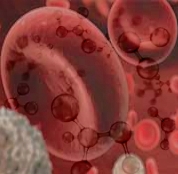
- Molecules called lipoxins, resolvins, and protectins are all derived from, or produced in response to, omega-3 fats.
- Deficiencies in pro-resolution molecules have been identified in most of the chronic, inflammation-related diseases of aging.
- Aging itself produces a total-body loss of these health-promoting molecules.
- Multiple studies reveal that supplementing with omega-3-rich fish oil boosts production of pro-resolution molecules and quickly brings your body back to a non-inflamed state.
- Human clinical trials demonstrate anti-inflammatory effects of fish oil supplementation in metabolic syndrome, cardiovascular disease, lung diseases, neurodegenerative conditions, and cancer, with additional evidence flowing in daily.
- Fish oil can no longer be considered an optional supplement; rather, it is a must-have for the prevention of the inflammatory conditions of aging.
Omega 3 and Cardiovascular Disease
 New evidence reveals that people with atherosclerosis have reduced levels and function of pro-resolution molecules, which helps explain their vulnerability to the inflammation that causes the disease.33
New evidence reveals that people with atherosclerosis have reduced levels and function of pro-resolution molecules, which helps explain their vulnerability to the inflammation that causes the disease.33
Boosting levels of these pro-resolution molecules would be especially important to people with cardiovascular disease because they have been found to reduce cholesterol, lower blood pressure, block clot-promoting platelet activation, prevent heart arrhythmias, prevent vascular inflammation and improve vascular function, and protect the heart muscle following a heart attack.34-39 That immense spectrum of action has led some researchers to describe omega-3s as a "polypill," capable of attacking multiple targets of cardiovascular health at once.34,40
Human studies of the long chain omega-3 fatty acids found in fish oil in individuals with cardiovascular disease reveal the following important effects:
- People with the highest blood levels of the EPA have about a 50% lower risk of congestive heart failure compared to those with the lowest levels, and survival in heart failure patients is enhanced by 35% in those with the highest levels of omega-3s.41,42
- Supplementing with 300 mg EPA and 1,500 mg DHA from fish oil significantly improves electrical parameters in the hearts of people with paroxysmal atrial fibrillation, a potentially dangerous heart arrhythmia.43
- Two grams/day of omega-3s yielding 850 to 882 mg of EPA and DHA nearly doubles the likelihood of successfully treated paroxysmal atrial fibrillation one year after electrical cardioversion treatment.44
- 2,000 mg/day of omega-3s decreases triglyceride levels by 21% and improves endothelial function in a fashion similar to that of the lipid-lowering drug fenofibrate.45
- Supplementing with approximately 1,860 mg EPA and 1,500 mg DHA, significantly increases heart muscle pumping ability and gives a survival advantage to people with chronic heart failure, improving endothelial function and lowering the inflammatory mediator IL-6.46
- Adding 1,800 mg/day of EPA to statin treatment prevents the progression of arterial stiffness more effectively than statins alone.47
- Blood pressure spikes from mental stress can be reduced by supplementing with 1,000 mg EPA and 400 mg DHA.48
Paroxysmal atrial fibrillation is a type of atrial fibrillation in which the irregular heartbeat occurs every so often. The heart eventually returns to its normal rhythm. It is hard to predict when episodes of paroxysmal atrial fibrillation will occur, and the causes are generally unknown. About 1 in 4 people with this condition will eventually develop permanent atrial fibrillation. Recent studies showing that EPA/DHA supplements double electrical cardioversion treatment efficacy make omega-3 supplements an exciting adjuvant approach in the control of atrial fibrillation.
Lung Disease: Asthma and COPD
 Lung diseases such as asthma and chronic obstructive pulmonary disease (COPD) are well known to involve out-of-control inflammation.49-51 Recent discoveries reveal that asthmatics have reduced production of pro-resolution molecules.12,49,52 Other studies have found that experimental animals treated with these omega-3 derivatives have less severe asthma attacks.53-55
Lung diseases such as asthma and chronic obstructive pulmonary disease (COPD) are well known to involve out-of-control inflammation.49-51 Recent discoveries reveal that asthmatics have reduced production of pro-resolution molecules.12,49,52 Other studies have found that experimental animals treated with these omega-3 derivatives have less severe asthma attacks.53-55
Those observations have led to experiments showing that supplementation with fish oils containing omega-3s boosts tissue levels of pro-resolution molecules, with marked improvement of asthmatic symptoms.53,56,57
It is becoming clear that the abnormal inflammation in asthma begins in utero, before a child is born58—possibly because of inadequate amounts of the pro-resolution molecules derived from omega-3s. This has led to intense interest in supplementing pregnant women with fish oil to prevent asthma and allergies in their offspring.58,59
Over the past decade, higher-dose omega-3-rich fish oil supplements have been used with remarkable success in reducing inflammation and the severity of asthma and COPD in humans:
- Supplementing with 1,000 mg/day EPA and 2,000 mg/day DHA from fish oil reduced levels of inflammatory cytokines in newborns; infants of supplemented mothers had a 3-fold lower risk of positive skin testing for egg allergy, and less severe eczema in later life.59
- A long-term follow-up of pregnant women supplemented with 320 mg EPA and 230 mg DHA from fish oil revealed a 63% reduction in the rate of asthma in their children, and an 87% reduction in the rate of allergic asthma.58
- Supplementing with fish oil containing 3,200 mg of EPA and 2,200 mg of DHA per day in athletes with exercise-induced asthma improved their pulmonary function nearly 5-fold, while lowering levels of inflammatory cytokines.60
- In non-athletes, 3,200 mg/day of EPA and 2,000 mg/day of DHA improved lung function to the point that exercise-induced asthma was no longer diagnosable, and led to a significant reduction in the use of asthma medications.61
- Children with a high risk of asthma had a 10% reduction in coughing over a 3-year study of omega-3 supplementation.63
- Children with moderate asthma who took omega-3 supplements experienced marked improvements in asthma symptoms and lung function.64
- Following omega-3 supplementation, COPD patients experienced significant improvements in difficulty breathing, oxygen saturation in their blood, and in the distance they could walk in six minutes.51
Omega 3 and Cognition
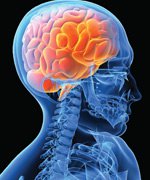 Inflammation is widely recognized as a major contributor to chronic neurodegenerative diseases such as Alzheimer's and Parkinson's; it is an active component of damage from strokes and other vascular diseases of the brain.65
Inflammation is widely recognized as a major contributor to chronic neurodegenerative diseases such as Alzheimer's and Parkinson's; it is an active component of damage from strokes and other vascular diseases of the brain.65
Studies now show that fish oil-derived pro-resolution molecules play an important role in stopping neuro-inflammation.65,66 That's leading to widespread hope that these mediators might help prevent and resolve some of the most heartbreaking conditions of aging.67-69
Extensive data exist on the role of omega-3 (especially DHA) supplementation in the cognitive decline of aging. Here are some of the most compelling findings:
- Reduced intake of DHA produces faster rates of cognitive decline and more rapid development of dementia.70
- DHA supplementation improves moderately severe dementia that arises from certain kinds of strokes.71
- Daily supplementation of 1,700 mg of DHA and 600 mg of EPA in patients with Alzheimer's disease produced a reduction in the rate of decline on the mini-mental status exam, but only in patients with early, mild disease.68 This study shows the importance of routine supplementation before developing symptoms.
- Daily supplementation of 1,700 mg of DHA and 600 mg of EPA was shown to produce significant increases in appetite and body weight in patients with Alzheimer's.72
- Patients with mild cognitive impairment or age-related cognitive decline showed significant improvements in immediate memory, learning, and attention after up to 900 mg of DHA supplementation.73,74
- Patients with Parkinson's disease and depression showed a significant reduction in depression scores following 12 weeks of fish oil supplements.75
- Older women, even those without diagnosed cognitive impairment, showed improved verbal fluency and memory scores, with improved rates of learning, following four months of DHA supplementation.76
Omega 3 and Cancer
 One of the deadliest results of unresolved chronic inflammation is cancer.77 Years of study have shown that cancer development is associated with increased amounts of inflammatory cytokines.78
One of the deadliest results of unresolved chronic inflammation is cancer.77 Years of study have shown that cancer development is associated with increased amounts of inflammatory cytokines.78
Newer research is revealing that fish oil has exciting possibilities for slowing—or even preventing—cancer.79,80
Here's what recent studies are showing:
- Women with a history of breast cancer who have the highest EPA and DHA intakes have about a 25% lower risk of additional breast cancer events compared with those having the lowest intake.81
- 4,000 mg/day of EPA supplements produced a 36% increase in skin sunburn threshold and reduced DNA damage from ultraviolet light; together these effects reduce the risk of skin cancer.82
- 2,000 mg/day of EPA significantly reduced findings of abnormal precancerous "crypt cells" on colonoscopy, indicating a reduction in colon cancer risk.83
- Animal studies show that fish oil supplementation delays the progression of lymphoma in mice through the modulation of immune responses and inflammation.84
- Men taking 1,000 mg EPA and 1,835 mg DHA fish oil daily prior to radical prostate surgery showed significant reductions in cancer cell proliferation.85
- Lung cancer patients on chemotherapy taking 2.2 grams of EPA/day prevented treatment-associated weight loss with 69% of patients gaining weight after supplementation.86
- Another lung cancer study showed increased chemotherapy response and a trend toward greater one-year survival in patients supplemented with fish oil.87
Summary
The growing importance of fish oil in the diet is highlighted by the remarkable discovery of the pro-resolution molecules lipoxins, resolvins, and protectins.
These molecules initiate an active healing process, triggering the resolution of inflammation within minutes of its beginning. The problem has been in the chronic inflammatory diseases of aging—and in aging itself—there's a shortage of these healing substances.
A breakthrough 2012 study revealed that these molecules can be directly produced in tissues from the omega-3 fatty acids found in fish oil. That eliminates the need for synthetic drugs aimed at mimicking the effects of pro-resolution healing molecules and opens the door to self-management by supplementation with a high-quality fish oil supplement.
Doses of 2 to 6 grams/day of omega-3 rich fish oil have been shown to reduce the occurrence and consequences of metabolic syndrome, cardiovascular disease, lung disease, the major neurodegenerative diseases, and cancer. Additional benefits are being reported in arthritis, age-related eye diseases, and oral health.8,88-101
Fish oil, rich in omega-3 fats, is no longer optional; it is a must-have for those interested in quelling inflammation and promoting natural healing in their bodies.
Material used with permission of Life Extension. All rights reserved.
1. Zargar A, Ito MK. Long chain omega-3 dietary supplements: a review of the National Library of Medicine Herbal Supplement Database. Metab Syndr Relat Disord. 2011 Aug;9(4):255-71.
2. Serhan CN, Chiang N. Novel endogenous small molecules as the checkpoint controllers in inflammation and resolution: entree for resoleomics. Rheum Dis Clin North Am. 2004 Feb;30(1):69-95.
3. Levy BD, De Sanctis GT, Devchand PR, et al. Multi-pronged inhibition of airway hyper-responsiveness and inflammation by lipoxin A(4). Nat Med. 2002 Sep;8(9):1018-23.
4. Fiorucci S, Wallace JL, Mencarelli A, et al. A beta-oxidation-resistant lipoxin A4 analog treats hapten-induced colitis by attenuating inflammation and immune dysfunction. Proc Natl Acad Sci U S A. 2004 Nov 2;101(44):15736-41.
5. Norris PC, Dennis EA. Omega-3 fatty acids cause dramatic changes in TLR4 and purinergic eicosanoid signaling. Proc Natl Acad Sci U S A. 2012 May 29;109(22):8517-22.
6. Serhan CN, Chiang N, Van Dyke TE. Resolving inflammation: dual anti-inflammatory and pro-resolution lipid mediators. Nat Rev Immunol. 2008 May;8(5):349-61.
7. Fredman G, Serhan CN. Specialized proresolving mediator targets for RvE1 and RvD1 in peripheral blood and mechanisms of resolution. Biochem J. 2011 Jul 15;437(2):185-97.
8. Sperling RI. Eicosanoids in rheumatoid arthritis. Rheum Dis Clin North Am. 1995 Aug;21(3):741-58.
9. James MJ, Gibson RA, Cleland LG. Dietary polyunsaturated fatty acids and inflammatory mediator production. Am J Clin Nutr. 2000 Jan;71(1 Suppl):343S-8S.
10. Schwab JM, Chiang N, Arita M, Serhan CN. Resolvin E1 and protectin D1 activate inflammation-resolution programmes. Nature. 2007 Jun 14;447(7146):869-74.
11. Bazan NG, Musto AE, Knott EJ. Endogenous signaling by omega-3 docosahexaenoic acid-derived mediators sustains homeostatic synaptic and circuitry integrity. Mol Neurobiol. 2011 Oct;44(2):216-22.
12. Levy BD, Bonnans C, Silverman ES, Palmer LJ, Marigowda G, Israel E. Diminished lipoxin biosynthesis in severe asthma. Am J Respir Crit Care Med. 2005 Oct 1;172(7):824-30.
13. Lukiw WJ, Cui JG, Marcheselli VL, et al. A role for docosahexaenoic acid-derived neuroprotectin D1 in neural cell survival and Alzheimer disease. J Clin Invest. 2005 Oct;115(10):2774-83.
14. White PJ, Arita M, Taguchi R, Kang JX, Marette A. Transgenic restoration of long-chain n-3 fatty acids in insulin target tissues improves resolution capacity and alleviates obesity-linked inflammation and insulin resistance in high-fat-fed mice. Diabetes. 2010 Dec;59(12):3066-73.
15. Gangemi S, Pescara L, D’Urbano E, et al. Aging is characterized by a profound reduction in anti-inflammatory lipoxin A4 levels. Exp Gerontol. 2005 Jul;40(7):612-4.
16. Pauwels EK, Kostkiewicz M. Fatty acid facts, Part III: Cardiovascular disease, or, a fish diet is not fishy. Drug News Perspect. 2008 Dec;21(10):552-61.
17. Gonzalez-Periz A, Claria J. Resolution of adipose tissue inflammation. ScientificWorldJournal. 2010;10:832-56.
18. Kopecky J, Rossmeisl M, Flachs P, et al. n-3 PUFA: bioavailability and modulation of adipose tissue function. Proc Nutr Soc. 2009 Nov;68(4):361-9. Epub 2009 Aug 24.
19. Flachs P, Ruhl R, Hensler M, et al. Synergistic induction of lipid catabolism and anti-inflammatory lipids in white fat of dietary obese mice in response to calorie restriction and n-3 fatty acids. Diabetologia. 2011 Oct;54(10):2626-38.
20. Hellmann J, Tang Y, Kosuri M, Bhatnagar A, Spite M. Resolvin D1 decreases adipose tissue macrophage accumulation and improves insulin sensitivity in obese-diabetic mice. FASEB J. 2011 Jul;25(7):2399-407.
21. Gonzalez-Periz A, Horrillo R, Ferre N, et al. Obesity-induced insulin resistance and hepatic steatosis are alleviated by omega-3 fatty acids: a role for resolvins and protectins. FASEB J. 2009 Jun;23(6):1946-57.
22. Titos E, Rius B, Gonzalez-Periz A, et al. Resolvin D1 and its precursor docosahexaenoic acid promote resolution of adipose tissue inflammation by eliciting macrophage polarization toward an M2-like phenotype. J Immunol. 2011 Nov 15;187(10):5408-18.
23. Bellenger J, Bellenger S, Bataille A, et al. High pancreatic n-3 fatty acids prevent STZ-induced diabetes in fat-1 mice: inflammatory pathway inhibition. Diabetes. 2011 Apr;60(4):1090-9.
24. Paniagua JA, Perez-Martinez P, Gjelstad IM, et al. A low-fat high-carbohydrate diet supplemented with long-chain n-3 PUFA reduces the risk of the metabolic syndrome. Atherosclerosis. 2011 Oct;218(2):443-50.
25. Dangardt F, Osika W, Chen Y, et al. Omega-3 fatty acid supplementation improves vascular function and reduces inflammation in obese adolescents. Atherosclerosis. 2010 Oct;212(2):580-5.
26. Pedersen MH, Molgaard C, Hellgren LI, Lauritzen L. Effects of fish oil supplementation on markers of the metabolic syndrome. J Pediatr. 2010 Sep;157(3):395-400.
27. Stirban A, Nandrean S, Gotting C, et al. Effects of n-3 fatty acids on macro- and microvascular function in subjects with type 2 diabetes mellitus. Am J Clin Nutr. 2010 Mar;91(3):808-13.
28. Fakhrzadeh H, Ghaderpanahi M, Sharifi F, et al. The effects of low dose n-3 fatty acids on serum lipid profiles and insulin resistance of the elderly: a randomized controlled clinical trial. Int J Vitam Nutr Res. 2010 Apr;80(2):107-16.
29. Jimenez-Gomez Y, Marin C, Peerez-Martinez P, et al. A low-fat, high-complex carbohydrate diet supplemented with long-chain (n-3) fatty acids alters the postprandial lipoprotein profile in patients with metabolic syndrome. J Nutr. 2010 Sep;140(9):1595-601.
30. Kromhout D, Geleijnse JM, de Goede J, et al. n-3 fatty acids, ventricular arrhythmia-related events, and fatal myocardial infarction in postmyocardial infarction patients with diabetes. Diabetes Care. 2011 Dec;34(12):2515-20.
31. Lopez-Alarcon M, Martinez-Coronado A, Velarde-Castro O, Rendon-Macias E, Fernandez J. Supplementation of n3 long-chain polyunsaturated fatty acid synergistically decreases insulin resistance with weight loss of obese prepubertal and pubertal children. Arch Med Res. 2011 Aug;42(6):502-8.
32. Parker HM, Johnson NA, Burdon CA, Cohn JS, O’Connor HT, George J. Omega-3 supplementation and non-alcoholic fatty liver disease: a systematic review and meta-analysis. J Hepatol. 2012 Apr;56(4):944-51.
33. Merched AJ, Ko K, Gotlinger KH, Serhan CN, Chan L. Atherosclerosis: evidence for impairment of resolution of vascular inflammation governed by specific lipid mediators. FASEB J. 2008 Oct;22(10):3595-606.
34. Das UN. Essential fatty acids and their metabolites could function as endogenous HMG-CoA reductase and ACE enzyme inhibitors, anti-arrhythmic, anti-hypertensive, anti-atherosclerotic, anti-inflammatory, cytoprotective, and cardioprotective molecules. Lipids Health Dis. 2008;7:37.
35. Dona M, Fredman G, Schwab JM, et al. Resolvin E1, an EPA-derived mediator in whole blood, selectively counterregulates leukocytes and platelets. Blood. 2008 Aug 1;112(3):848-55.
36. Spite M, Norling LV, Summers L, et al. Resolvin D2 is a potent regulator of leukocytes and controls microbial sepsis. Nature. 2009 Oct 29;461(7268):1287-91.
37. Fredman G, Van Dyke TE, Serhan CN. Resolvin E1 regulates adenosine diphosphate activation of human platelets. Arterioscler Thromb Vasc Biol. 2010 Oct;30(10):2005-13.
38. Ho KJ, Spite M, Owens CD, et al. Aspirin-triggered lipoxin and resolvin E1 modulate vascular smooth muscle phenotype and correlate with peripheral atherosclerosis. Am J Pathol. 2010 Oct;177(4):2116-23.
39. Keyes KT, Ye Y, Lin Y, et al. Resolvin E1 protects the rat heart against reperfusion injury. Am J Physiol Heart Circ Physiol. 2010 Jul;299(1):H153-64.
40. Das UN. Do polyunsaturated fatty acids behave like an endogenous “polypill”? Med Hypotheses. 2008;70(2):430-4. Epub 2007 Jul 10.
41. Mozaffarian D, Lemaitre RN, King IB, et al. Circulating long-chain omega-3 fatty acids and incidence of congestive heart failure in older adults: the cardiovascular health study: a cohort study. Ann Intern Med. 2011 Aug 2;155(3):160-70.
42. Jiang W, Oken H, Fiuzat M, et al. Plasma omega-3 polyunsaturated fatty acids and survival in patients with chronic heart failure and major depressive disorder. J Cardiovasc Transl Res. 2012 Feb;5(1):92-9.
43. Kumar S, Sutherland F, Teh AW, et al. Effects of chronic omega-3 polyunsaturated fatty acid supplementation on human pulmonary vein and left atrial electrophysiology in paroxysmal atrial fibrillation. Am J Cardiol. 2011 Aug 15;108(4):531-5.
44. Nodari S, Triggiani M, Campia U, et al. n-3 polyunsaturated fatty acids in the prevention of atrial fibrillation recurrences after electrical cardioversion: a prospective, randomized study. Circulation. 2011 Sep 6;124(10):1100-6.
45. Koh KK, Quon MJ, Shin KC, et al. Significant differential effects of omega-3 fatty acids and fenofibrate in patients with hypertriglyceridemia. Atherosclerosis. 2012 Feb;220(2):537-44.
46. Moertl D, Hammer A, Steiner S, Hutuleac R, Vonbank K, Berger R. Dose-dependent effects of omega-3-polyunsaturated fatty acids on systolic left ventricular function, endothelial function, and markers of inflammation in chronic heart failure of nonischemic origin: a double-blind, placebo-controlled, 3-arm study. Am Heart J. 2011 May;161(5):915 e1-9.
47. Takaki A, Umemoto S, Ono K, et al. Add-on therapy of EPA reduces oxidative stress and inhibits the progression of aortic stiffness in patients with coronary artery disease and statin therapy: a randomized controlled study. J Atheroscler Thromb. 2011;18(10):857-66.
48. Ginty AT, Conklin SM. Preliminary evidence that acute long-chain omega-3 supplementation reduces cardiovascular reactivity to mental stress: a randomized and placebo controlled trial. Biol Psychol. 2012 Jan;89(1):269-72.
49. Haworth O, Levy BD. Endogenous lipid mediators in the resolution of airway inflammation. Eur Respir J. 2007 Nov;30(5):980-92.
50. Rao NL, Riley JP, Banie H, et al. Leukotriene A(4) hydrolase inhibition attenuates allergic airway inflammation and hyperresponsiveness. Am J Respir Crit Care Med. 2010 May 1;181(9):899-907.
51. Matsuyama W, Mitsuyama H, Watanabe M, et al. Effects of omega-3 polyunsaturated fatty acids on inflammatory markers in COPD. Chest. 2005 Dec;128(6):3817-27.
52. Carlo T, Levy BD. Chemical mediators and the resolution of airway inflammation. Allergol Int. 2008 Dec;57(4):299-305.
53. Levy BD, Kohli P, Gotlinger K, et al. Protectin D1 is generated in asthma and dampens airway inflammation and hyperresponsiveness. J Immunol. 2007 Jan 1;178(1):496-502.
54. Hisada T, Ishizuka T, Aoki H, Mori M. Resolvin E1 as a novel agent for the treatment of asthma. Expert Opin Ther Targets. 2009 May;13(5):513-22.
55. Aoki H, Hisada T, Ishizuka T, et al. Protective effect of resolvin E1 on the development of asthmatic airway inflammation. Biochem Biophys Res Commun. 2010 Sep 10;400(1):128-33.
56. Leemans J, Cambier C, Chandler T, et al. Prophylactic effects of omega-3 polyunsaturated fatty acids and luteolin on airway hyperresponsiveness and inflammation in cats with experimentally-induced asthma. Vet J. 2010 Apr;184(1):111-4.
57. Bilal S, Haworth O, Wu L, Weylandt KH, Levy BD, Kang JX. Fat-1 transgenic mice with elevated omega-3 fatty acids are protected from allergic airway responses. Biochim Biophys Acta. 2011 Sep;1812(9):1164-9.
58. Olsen SF, Osterdal ML, Salvig JD, et al. Fish oil intake compared with olive oil intake in late pregnancy and asthma in the offspring: 16 y of registry-based follow-up from a randomized controlled trial. Am J Clin Nutr. 2008 Jul;88(1):167-75.
59. Dunstan JA, Mori TA, Barden A, et al. Fish oil supplementation in pregnancy modifies neonatal allergen-specific immune responses and clinical outcomes in infants at high risk of atopy: a randomized, controlled trial. J Allergy Clin Immunol. 2003 Dec;112(6):1178-84.
60. Mickleborough TD, Murray RL, Ionescu AA, Lindley MR. Fish oil supplementation reduces severity of exercise-induced bronchoconstriction in elite athletes. Am J Respir Crit Care Med. 2003 Nov 15;168(10):1181-9.
61. Mickleborough TD, Lindley MR, Ionescu AA, Fly AD. Protective effect of fish oil supplementation on exercise-induced bronchoconstriction in asthma. Chest. 2006 Jan;129(1):39-49.
62. Schubert R, Kitz R, Beermann C, et al. Effect of n-3 polyunsaturated fatty acids in asthma after low-dose allergen challenge. Int Arch Allergy Immunol. 2009;148(4):321-9.
63. Peat JK, Mihrshahi S, Kemp AS, et al. Three-year outcomes of dietary fatty acid modification and house dust mite reduction in the Childhood Asthma Prevention Study. J Allergy Clin Immunol. 2004 Oct;114(4):807-13.
64. Biltagi MA, Baset AA, Bassiouny M, Kasrawi MA, Attia M. Omega-3 fatty acids, vitamin C and Zn supplementation in asthmatic children: a randomized self-controlled study. Acta Paediatr. 2009 Apr;98(4):737-42.
65. Farooqui AA, Ong WY, Horrocks LA, Chen P, Farooqui T. Comparison of biochemical effects of statins and fish oil in brain: the battle of the titans. Brain Res Rev. 2007 Dec;56(2):443-71.
66. Tassoni D, Kaur G, Weisinger RS, Sinclair AJ. The role of eicosanoids in the brain. Asia Pac J Clin Nutr. 2008;17 Suppl 1:220-8.
67. Orr SK, Bazinet RP. The emerging role of docosahexaenoic acid in neuroinflammation. Curr Opin Investig Drugs. 2008 Jul;9(7):735-43.
68. Freund-Levi Y, Eriksdotter-Jonhagen M, Cederholm T, et al. Omega-3 fatty acid treatment in 174 patients with mild to moderate Alzheimer disease: OmegAD study: a randomized double-blind trial. Arch Neurol. 2006 Oct;63(10):1402-8.
69. Cole GM, Frautschy SA. DHA may prevent age-related dementia. J Nutr. 2010 Apr;140(4):869-74. 70. Jicha GA, Markesbery WR. Omega-3 fatty acids: potential role in the management of early Alzheimer’s disease. Clin Interv Aging. 2010;5:45-61.
71. Bazan NG. Neuroprotectin D1-mediated anti-inflammatory and survival signaling in stroke, retinal degenerations, and Alzheimer’s disease. J Lipid Res. 2009 Apr;50 Suppl:S400-5. Epub 2008 Nov 18.
72. Irving GF, Freund-Levi Y, Eriksdotter-Jonhagen M, et al. Omega-3 fatty acid supplementation effects on weight and appetite in patients with Alzheimer’s disease: the omega-3 Alzheimer’s disease study. J Am Geriatr Soc. 2009 Jan;57(1):11-7.
73. Kotani S, Sakaguchi E, Warashina S, et al. Dietary supple-mentation of arachidonic and docosahexaenoic acids improves cognitive dysfunction. Neurosci Res. 2006 Oct;56(2):159-64.
74. Yurko-Mauro K, McCarthy D, Rom D, et al. Beneficial effects of docosahexaenoic acid on cognition in age-related cognitive decline. Alzheimers Dement. 2010 Nov;6(6):456-64.
75. da Silva TM, Munhoz RP, Alvarez C, et al. Depression in Parkinson’s disease: a double-blind, randomized, placebo-controlled pilot study of omega-3 fatty-acid supplementation. J Affect Disord. 2008 Dec;111(2-3):351-9.
76. Johnson EJ, McDonald K, Caldarella SM, Chung HY, Troen AM, Snodderly DM. Cognitive findings of an exploratory trial of docosahexaenoic acid and lutein supplementation in older women. Nutr Neurosci. 2008 Apr;11(2):75-83.
77. Janakiram NB, Mohammed A, Rao CV. Role of lipoxins, resolvins, and other bioactive lipids in colon and pancreatic cancer. Cancer Metastasis Rev. 2011 Dec;30(3-4):507-23.
78. Greene ER, Huang S, Serhan CN, Panigrahy D. Regulation of inflammation in cancer by eicosanoids. Prostaglandins Other Lipid Mediat. 2011 Nov;96(1-4):27-36.
79. Wendel M, Heller AR. Anticancer actions of omega-3 fatty acids—current state and future perspectives. Anticancer Agents Med Chem. 2009 May;9(4):457-70.
80. Janakiram NB, Rao CV. Role of lipoxins and resolvins as anti-inflammatory and proresolving mediators in colon cancer. Curr Mol Med. 2009 Jun;9(5):565-79.
81. Patterson RE, Flatt SW, Newman VA, et al. Marine fatty acid intake is associated with breast cancer prognosis. J Nutr. 2011 Feb;141(2):201-6.
82. Rhodes LE, Shahbakhti H, Azurdia RM, et al. Effect of eicosapentaenoic acid, an omega-3 polyunsaturated fatty acid, on UVR-related cancer risk in humans. An assessment of early genotoxic markers. Carcinogenesis. 2003 May;24(5):919-25.
83. Courtney ED, Matthews S, Finlayson C, et al. Eicosapentaenoic acid (EPA) reduces crypt cell proliferation and increases apoptosis in normal colonic mucosa in subjects with a history of colorectal adenomas. Int J Colorectal Dis. 2007 Jul;22(7):765-76.
84. Johansson AS, Noren-Nystrom U, Larefalk A, Holmberg D, Lindskog M. Fish oil delays lymphoma progression in the TLL mouse. Leuk Lymphoma. 2010 Nov;51(11):2092-7.
85. Aronson WJ, Kobayashi N, Barnard RJ, et al. Phase II prospective randomized trial of a low-fat diet with fish oil supplementation in men undergoing radical prostatectomy. Cancer Prev Res (Phila). 2011 Dec;4(12):2062-71.
86. Murphy RA, Mourtzakis M, Chu QS, Baracos VE, Reiman T, Mazurak VC. Nutritional intervention with fish oil provides a benefit over standard of care for weight and skeletal muscle mass in patients with nonsmall cell lung cancer receiving chemotherapy. Cancer. 2011 Apr 15;117(8):1775-82.
87. Murphy RA, Mourtzakis M, Chu QS, Baracos VE, Reiman T, Mazurak VC. Supplementation with fish oil increases first-line chemotherapy efficacy in patients with advanced nonsmall cell lung cancer. Cancer. 2011 Aug 15;117(16):3774-80.
88. Adam O, Beringer C, Kless T, et al. Anti-inflammatory effects of a low arachidonic acid diet and fish oil in patients with rheumatoid arthritis. Rheumatol Int. 2003 Jan;23(1):27-36.
89. Berbert AA, Kondo CR, Almendra CL, Matsuo T, Dichi I. Supplementation of fish oil and olive oil in patients with rheumatoid arthritis. Nutrition. 2005 Feb;21(2):131-6.
90. Cleland LG, Caughey GE, James MJ, Proudman SM. Reduction of cardiovascular risk factors with longterm fish oil treatment in early rheumatoid arthritis. J Rheumatol. 2006 Oct;33(10):1973-9.
91. Fritsch D, Allen TA, Dodd CE, et al. Dose-titration effects of fish oil in osteoarthritic dogs. J Vet Intern Med. 2010 Sep-Oct;24(5):1020-6.
92. Gruenwald J, Petzold E, Busch R, Petzold HP, Graubaum HJ. Effect of glucosamine sulfate with or without omega-3 fatty acids in patients with osteoarthritis. Adv Ther. 2009 Sep;26(9):858-71.
93. Volker D, Fitzgerald P, Major G, Garg M. Efficacy of fish oil concentrate in the treatment of rheumatoid arthritis. J Rheumatol. 2000 Oct;27(10):2343-6.
94. Cangemi FE. TOZAL Study: an open case control study of an oral antioxidant and omega-3 supplement for dry AMD. BMC Ophthalmol. 2007;7:3.
95. Johnson EJ, Chung HY, Caldarella SM, Snodderly DM. The influence of supplemental lutein and docosahexaenoic acid on serum, lipoproteins, and macular pigmentation. Am J Clin Nutr. 2008 May;87(5):1521-9.
96. Macsai MS. The role of omega-3 dietary supplementation in blepharitis and meibomian gland dysfunction (an AOS thesis). Trans Am Ophthalmol Soc. 2008;106:336-56.
97. Wojtowicz JC, Butovich I, Uchiyama E, Aronowicz J, Agee S, McCulley JP. Pilot, prospective, randomized, double-masked, placebo-controlled clinical trial of an omega-3 supplement for dry eye. Cornea. 2011 Mar;30(3):308-14.
98. Bendyk A, Marino V, Zilm PS, Howe P, Bartold PM. Effect of dietary omega-3 polyunsaturated fatty acids on experimental periodontitis in the mouse. J Periodontal Res. 2009 Apr;44(2):211-6.
99. El-Sharkawy H, Aboelsaad N, Eliwa M, et al. Adjunctive treatment of chronic periodontitis with daily dietary supplementation with omega-3 Fatty acids and low-dose aspirin. J Periodontol. 2010 Nov;81(11):1635-43.
100. Kesavalu L, Bakthavatchalu V, Rahman MM, et al. Omega-3 fatty acid regulates inflammatory cytokine/mediator messenger RNA expression in Porphyromonas gingivalis-induced experimental periodontal disease. Oral Microbiol Immunol. 2007 Aug;22(4):232-9.
101. Naqvi AZ, Buettner C, Phillips RS, Davis RB, Mukamal KJ. n-3 fatty acids and periodontitis in US adults. J Am Diet Assoc. 2010 Nov;110(11):1669-75.
102. Palacios-Pelaez R, Lukiw WJ, Bazan NG. Omega-3 essential fatty acids modulate initiation and progression of neurodegenerative disease. Mol Neurobiol. 2010 Jun;41(2-3):367-74.

